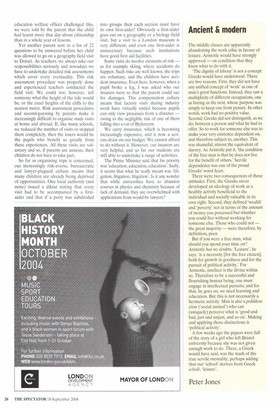Ancient & modern
The middle classes are apparently abandoning the work ethic in favour of leisure. Aristotle would have strongly approved — on condition that they knew what to do with it.
'The dignity of labour' is not a concept Greeks would have understood. There are two reasons. First, they did not have any unified concept of 'work' as one of man's great functions. Instead, they saw a multiplicity of different occupations, one as boring as the next, whose purpose was simply to keep one from penury. In other words, work had no positive value. Second, Greeks did not distinguish, as we do, between a person and what he had to offer. So to work for someone else was to make your very existence dependent on, and therefore subject to, another. This was shameful, almost the equivalent of slavery. As Aristotle put it, 'the condition of the free man is that he does not live for the benefit of others.' Servile dependency was one of the proud Greeks' worst fears.
There were two consequences of these attitudes. First, the Greeks never developed an ideology of work as a healthy activity beneficial to the individual and socially valuable in its own right. Second, they defined 'wealth' and 'poverty' not in terms of the amount of money you possessed but whether you could live without working for someone else. Those who could not — the great majority — were therefore, by definition, poor.
But if you were a free man, what should you spend your time on? Aristotle has no doubts. 'Leisure', he says, Is a necessity [for the free citizen], both for growth in goodness and for the pursuit of political activity.' For Aristotle, intellect is the divine within us. Therefore to be a successful and flourishing human being, one must engage in intellectual pursuits; and for that, he goes on, we need learning and education. But this is not necessarily a hermetic activity. Man is also a politikon than ('social animal') who can (uniquely) perceive what is 'good and bad, just and unjust, and so on'. Making and applying those distinctions is 'political activity'.
A few weeks ago the papers were full of the story of a girl who left Bristol university because she was not given enough work to do. There, a Greek would have said, was the mark of the true servile mentality, perhaps adding that our 'school' derives from Greek schole, 'leisure'.


















































































 Previous page
Previous page